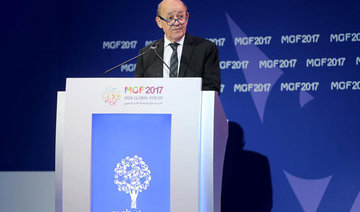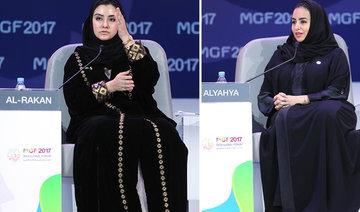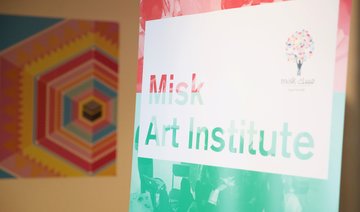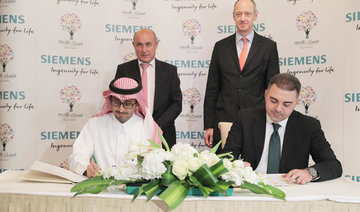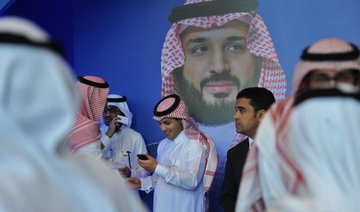RIYADH: While some see artificial intelligence as a leap to the next developmental stage for humankind, many people are worried about jobs, said Riad Hamade, executive editor for the Middle East and Africa, Bloomberg News.
The young generation now wonders what type of jobs they should be looking for, especially after talk of smart cities powered by robots became so relevant.
“Robotics and artificial intelligence have different meanings to different people,” said Esther Baldwin, artificial intelligence strategist for Intel.
She argued that artificial intelligence is “nothing new,” and that people have had degrees in this topic since the 1980s.
Baldwin was speaking on the first day of the MiSK Global Forum, which brings young leaders, creators and thinkers together with established innovators to explore ways to meet challenges of change.
“It’s only in recent research breakthroughs that have made more natural language processing possible, but robots seem to be a topic that engenders more fear that they will take people’s jobs away or they may be dangerous,” she said, adding that it is important to define what a robot is.
Baldwin, who has spent over 25 years at Intel, pointed out that robots can be anything from very small automated devices, all the way up to something that is much more sophisticated.
Addressing autonomous vehicles, Baldwin asked whether they can be counted as robots with humans inside them. “A human is now inside the autonomous vehicle and it is driving the person around. So, is that a robot?”
Seeing a robot walking around any time soon is still very unlikely, said William Tunstall-Pedoe, artificial intelligence entrepreneur formerly with Amazon Alexa.
With autonomous driving, said Tunstall-Pedoe, artificial intelligence does have an impact on jobs. “Autonomous cars are replacing the jobs of millions of people,” he said, adding that computers have started to do things that previously only the human brain could do.
Jobs will change once robots come along, but Hamade argued that “it is not like it is the first time in human history that industries have changed. The horse and carriage was a huge industry and then it disappeared.”
According to Hamade, agricultural jobs in the US have been declining for 170 years, and manufacturing jobs peaked in 1979 and have been declining ever since. “However, service jobs have been steadily rising for a very long time. So, what is the difference this time?”
“From the first industrial revolution until today, we have been talking about augmenting humans, making it easier for them to do their jobs,” said Baldwin, adding: “If you look at labor productivity, I don’t know anybody who is working fewer hours today than they did 10 or 15 years ago. Other than France, which has designated a shorter work week for people, most people are working the same number of hours, and so it is really a shift in what we are doing.”
Tunstall-Pedoe argued that the only difference between change in the 19th century/early 20th century and now is the pace of change. “I think there is plenty of evidence that the pace of change is increasing.”
It is not necessarily clear that new jobs will replace current jobs as happened in the past, as no one knows for sure what is going to happen, said Tunstall-Pedoe, who advised the young audience attending the forum that “the remedy is to keep learning, be part of this technological change and adapt to it, and continue to learn new skills so you don’t get left behind. Stay on top of technology, apply AI (artificial intelligence)to your existing business.”
He said that senior management jobs that involve complex management of people, evolved technologies and entrepreneurship are going to be the last ones to be replaced, contrary to the simpler jobs that will be among the first to be replaced.
Involving more people in coding and programing is not the answer, according to Baldwin.
“We already seeing applications where AI is doing coding. I trained as an engineer, and if I look at the advancements over the life of my career, I used to have to do manual drafting. I don’t have to do that anymore, because of high-performance computing and simulation.”
Engineers, she said, like to solve and frame problems, which is a “crucial” trait for which humans cannot be replaced.
“There are two things critical for success: Desire and opportunity,” she said, adding that “it is very apparent that the leaders of this country are providing the youth with opportunity. The question is — do the youth have the desire? And when you match these two together, you can only be successful.”
Artificial intelligence: Leap to next development stage or job threat?
Artificial intelligence: Leap to next development stage or job threat?
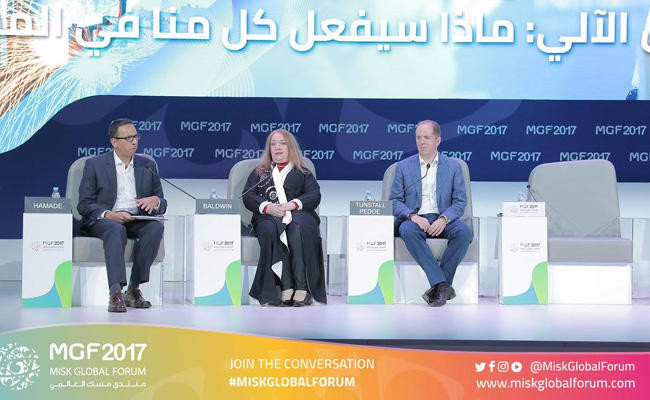
Saudi House kicks off Davos with push on Vision 2030, AI platform and ‘humanizing’ tourism

- Saudi ministers dominate pre-summit spotlight at Saudi pavilion, touting Vision 2030’s next phase and human capital as key to global edge
- Ministry of Economy and Planning announced the SUSTAIN Platform which aims to accelerate AI-enabled, cross-sector collaboration for sustainable development
DAVOS: For regulars at the World Economic Forum, Monday in Davos is usually a chance to ease into the week, a time to reconnect, plan meetings and prepare for the intense schedule ahead.
This year, Saudi Arabia moved quickly to fill that lull, taking center stage with a packed program of panels ahead of Tuesday’s official opening.
At the Saudi House — the Kingdom’s official pavilion on the Promenade, returning after its debut as a standalone venue at the 2025 WEF Annual Meeting — Saudi ministers and global executives set out how the Kingdom sees the next phase of its transformation.

Established by the Ministry of Economy and Planning, the venue is pitched as a platform for international thought leaders to tackle the challenges, opportunities and solutions shaping the global economy.
Opening a session on the Kingdom’s role at this year’s Forum and the next phase of Vision 2030 — now in its 10th year and roughly two-thirds complete — Princess Reema bint Bandar, Saudi Arabia’s ambassador to the US, said human capital “is the actual driver if you want a competitive, modern economy.”
She described one of the biggest achievements of the past decade as the emergence of a highly qualified cohort of young Saudis who could work anywhere in the world but “choose to come home, choose to build at home and choose to deliver at home,” calling this “the biggest symbol of the success of Vision 2030.”
Who can give you optimum access to opportunities while addressing risks? I contend that Saudi Arabia has been able to provide that formula.
Khalid Al-Falih, Saudi minister of investment
On the same panel, Minister of Finance Mohammed Aljadaan said this success is rooted in a “behavioral change” that has strengthened the Kingdom’s credibility with both international partners and its own citizens.
“Credibility comes from being very pragmatic, making sure that you maintain your fiscal policy discipline, but at the same time refocus your resources where it matters,” he said, warning that “markets will call your bluff if you’re not serious.”
The Saudi House, a cross-ministerial initiative led by the Ministry of Economy and Planning, is intended to underscore the Kingdom’s “commitment to global cooperation” by offering “a platform where visionary ideas are shared and shaped,” while showcasing opportunities and lessons from its “unprecedented national transformation.”

Echoing earlier comments to Arab News, Economy and Planning Minister Faisal Alibrahim said the Kingdom’s role as an anchor of stability has helped unlock its potential, stressing that while the objective is to decouple from reliance on a single commodity, “2030 is not the finishing line.”
Khalid Al-Falih, Saudi minister of investment, said Saudi Arabia has been able to enable access to opportunities while addressing major risks, arguing that few countries can match the Kingdom’s overall mix.
“No country has all of those to 100 percent,” he said. “But who can give you the mix that gives you optimum access to opportunities while addressing all of those risks?

“I contend that Saudi Arabia has been able to provide that formula and the proof is in the pudding,” noting that local investment has doubled in recent years to reach levels comparable with India and China.
While societal transformation dominated the morning discussions, the afternoon turned to technology, tourism, sport and culture, four strategic sectors expected to spearhead Vision 2030’s next phase.
The Ministry of Economy and Planning used the day to announce the SUSTAIN Platform, due to launch in 2026, which aims to accelerate AI-enabled, cross-sector collaboration for sustainable development.
The ministry said SUSTAIN will translate the Kingdom’s public and private-sector coordination mandate into a practical national tool to help government entities, businesses, investors, academia and civil society identify credible partners, form trusted coalitions and move initiatives “from planning to implementation more efficiently,” addressing a global challenge where fragmented partnerships often slow delivery and blunt impact.
“We are in a moment in time where technology may well impact the face of humanity,” said Dina Powell McCormick, recently appointed president and vice chairman of Meta, welcoming the Kingdom’s “desire” to partner with technology companies and its embrace of innovation.
Minister of Tourism Ahmed Alkhateeb, discussing how technology is being deployed in his sector, underlined that “in travel and tourism, people are very important. We learn about other people’s culture through interacting with people. We digitalize the unnecessary and humanize the necessary.”
He added that while technological transformation is a priority, “we don’t want to replace this big workforce with technology. I think we need to protect them in Saudi Arabia, where we’re being a model. I’m an advocate of keeping the people.”
Throughout the week, Saudi House will host more than 20 sessions, including over 10 accredited by the WEF, across six themes: Bold Vision, Insights for Impact, People and Human Capability, Quality of Life, Investment and Collaboration, and Welcoming the World.
The pavilion will also launch “NextOn,” a new series of influential and educational talks featuring leading global voices.



